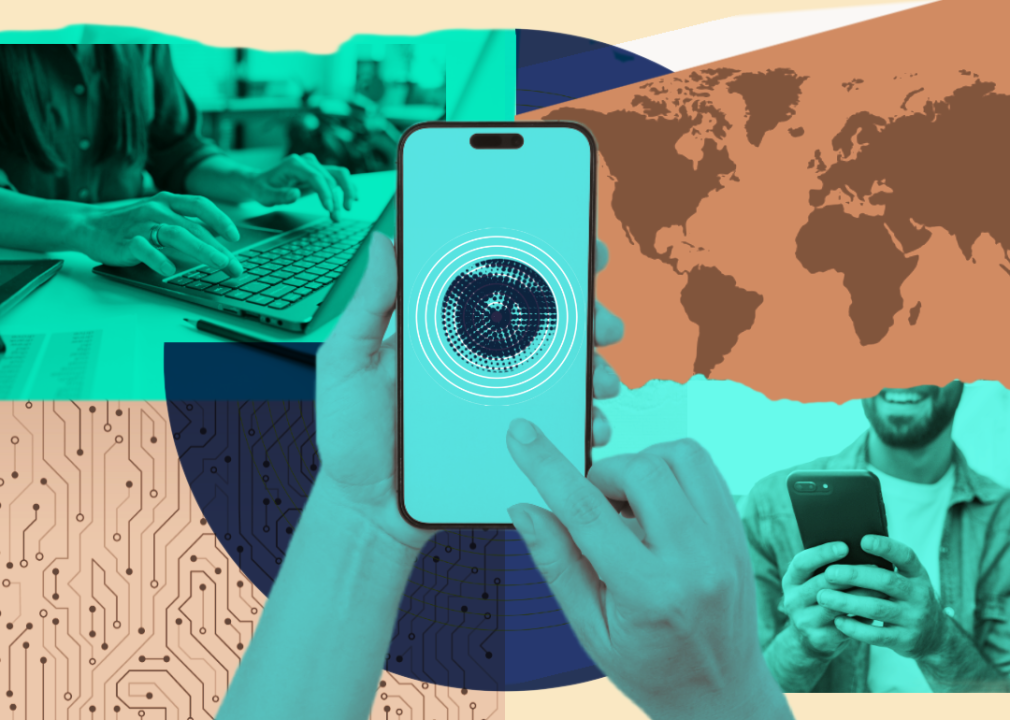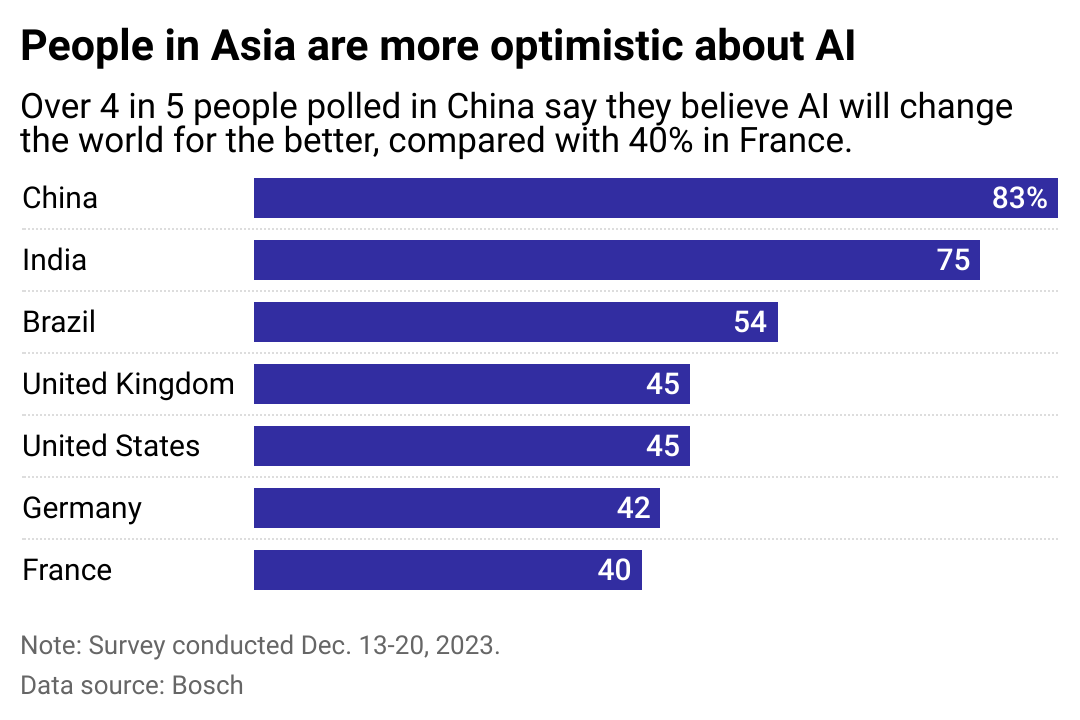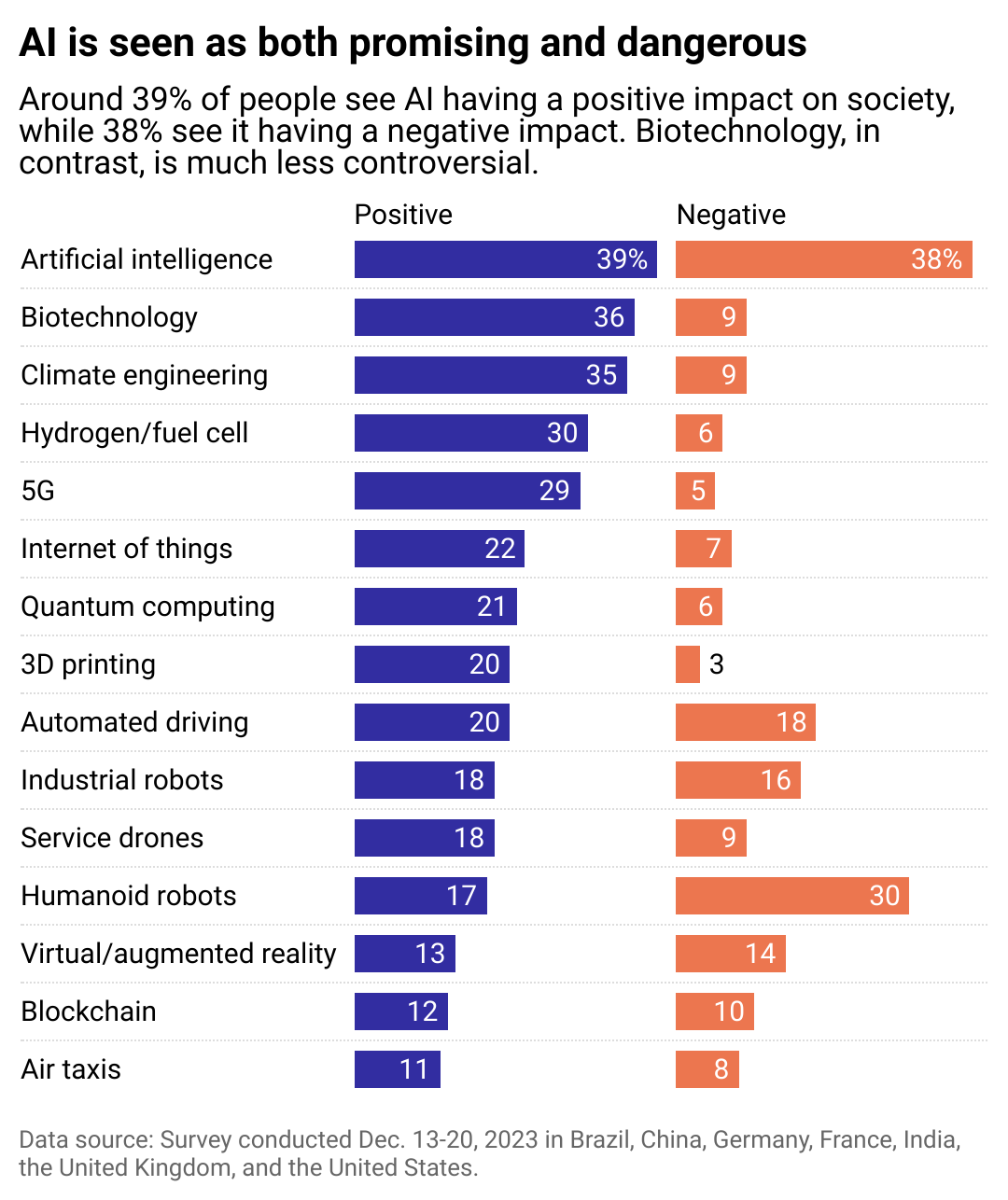Where in the world are people most optimistic about AI?

Photo illustration by Elizabeth Ciano // Stacker // Shutterstock
Where in the world are people most optimistic about AI?
Photo collage with hands using devices and map.
When the internet first became widely available in the 1990s, Americans and Canadians were among its quickest adopters. Shortly after, the rest of the world began to follow. Three decades later, the web has dramatically changed how people and businesses operate.
Today, around 90% of North Americans and 60% of people globally have access to the internet.
The majority of shopping, banking, and socializing occurs online. The IRS reports that around 90% of American taxpayers now file their taxes electronically, and, as of 2023, the Pew Research Center found that 58% of American adults say they prefer getting their news digitally, while only 27% say they get their news from television.
In 2022, when artificial intelligence took the world by surprise with the release of ChatGPT, some users were quick to compare its sudden advancement to the rise of the internet. After a decades-long “AI winter” of relatively stagnant progress, the technology suddenly started to move at a blistering pace. Two years later, chatbots are already changing how writers, programmers, and researchers work.
Verbit analyzed survey data from Bosch to see where in the world people are the most excited by AI and how they hope it will change their lives. According to the December 2023 survey conducted in seven countries, 73% of people worldwide believe generative AI is as consequential as the rise of the internet.
![]()

Verbit
Optimistic about AI
A bar chart looking at where people are most optimistic about AI. 83% of people in China, 75% of people in India, 54% of people in Brazil, 45% of people in the U.K., 45% of people in the U.S., 42% of people in Germany, and 40% of people in France say they believe AI will change the world for the better.
Bosch surveyed respondents between the ages of 18 and 69 from Brazil, China, Germany, France, India, the United Kingdom, and the United States. The survey might not be representative of adults in every country polled; in China, for instance, Bosch only interviewed people from the wealthiest cities.
The data reveals a striking trend: In general, respondents from middle-income countries are more optimistic about AI than those from high-income countries. Around 83% of respondents from China and 75% of people from India say that AI technologies will change the world for the better. In contrast, less than half of those surveyed in Germany, France, and the U.S. agreed with the sentiment.
One reason for this discrepancy might be that people from developing countries have more to gain from the rise of AI. Wealthier countries also tend to have more educated professionals, such as doctors. AI systems that are smart enough to replace doctors and white collar workers might give many people a chance to afford services that they otherwise would not be able to, improving quality of life.
China, India, and Brazil survey respondents ranked ‘better work outcomes’ higher than Western countries as a personal benefit of AI. Globally, respondents considered improving health and making life more comfortable among AI’s top advantages.
Another reason for the divide between middle- and high-income countries might be that those in developing countries tend to be more optimistic about economic forecasts. For instance, a survey conducted by Ipsos found that respondents in emerging markets were more likely to have confidence in the global economic outlook; 91% of people in Indonesia thought 2024 would be a better year for them than 2023. Only 65% of U.S. respondents and 39% of people in Japan agreed.

Verbit
AI comes with plenty of risks
A bar chart looking at whether people view certain technologies in a positive or a negative light. AI is controversial. 39% believe it will have a positive impact on society, while 38% believe it will have a negative impact. In contrast, biotechnology and climate engineering are much less controversial.
AI inspires awe and fear in nearly equal measure. About 2 in 5 survey participants believe AI will positively impact society—roughly the same share who believe AI will have a negative impact. Other emerging fields, such as biotechnology and climate engineering, were much less polarizing. Around 1 in 3 respondents thought those two technologies would be positive for society, while only 1 in 10 thought they would be harmful.
An estimated 52% of respondents said they worried AI might violate peoples’ privacy or manipulate people’s behavior. Many tech companies hope to build AI systems that can serve as personal assistants, a development that raises new privacy and security concerns.
In a recent interview with Sally Kornbluth, president of Massachusetts Institute of Technology, OpenAI CEO Sam Altman pointed out that a robot that reads your emails and keeps track of your everyday activities could be used against you, possibly in a legal situation.
The most commonly cited fear about AI was its job loss. Some 53% of respondents agreed that AI systems could automate their jobs and replace them. People were especially fearful of humanoid robots—only 17% of respondents said they expected such machines to have a positive impact on society while 30% said they expected androids to have a negative effect.
These fears are not unfounded. AI is developing quickly, and estimates about its impact on the job market vary. One 2023 analysis by Goldman Sachs estimates that AI could partially automate one-fourth of work tasks in America and two-thirds of occupations. According to the investment bank’s research, office administrative roles, legal professions, as well as architecture and engineering jobs are vulnerable to AI automation.
Historically, automation and new technology have vastly changed the workforce. For instance, agricultural innovations slashed the agricultural workforce; only about 1% of American workers are farmers today. The internet has eliminated certain businesses, such as movie rental stores and travel agencies.
However, innovations have also opened doors. Deep data engineers and prompt developers are just some of the roles AI might help create. If AI is as disruptive as the internet, it could mean that many jobs will become obsolete—and others will be born.
Story editing by Alizah Salario. Copy editing by Kristen Wegrzyn.
This story originally appeared on Verbit and was produced and
distributed in partnership with Stacker Studio.
